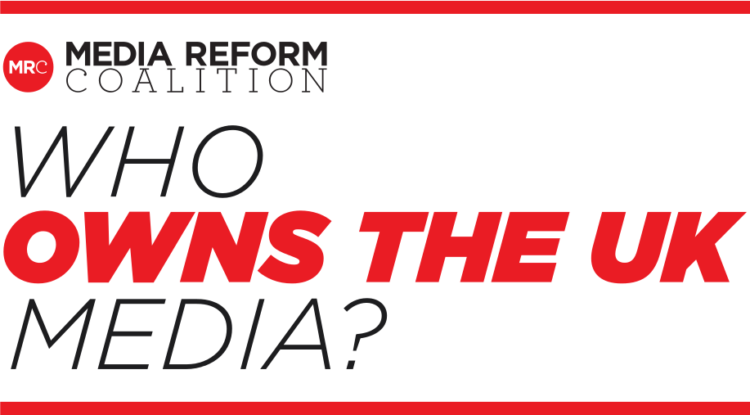By Tony O’Reilly-
A recent analysis conducted by the Media Reform Coalition has exposed the alarming extent of media ownership concentration in the UK.
The Media Reform Coalition has been at the forefront of the UK’s progressive media reform movement since 2011, producing evidence and giving oral testimony to a broad range of public inquiries into the media; engaging the public on media reform issues, and designing innovative solutions that address the most critical issues in media policy-making.
The Media Reform Coalition brings together activists, academics and media producers to challenge unaccountable media corporations and build an independent, democratic media system. Through research, lobbying and campaigning, we are leading the fight for a media fit for the 21st-century.
The organization run at Goldsmith’s University, said its manifesto builds on extensive academic research and a number of briefing reports produced by, and in consultation with, a broad range of experts and stakeholders.
The report, based on Ipsos iris data reveals that just three major publishers control over 40% of the audience reach of the UK’s top 50 online news brands.
It said its findings has raised concerns about the diversity and independence of the country’s media landscape.
Dominating Publishers
The dominating publishers in question are News Corp, DMG Media, and Reach. Their influence extends not only to the digital realm but also to print media, granting them a significant role in shaping the nation’s news agenda.
Reach’s digital news brands, for instance, account for more than a fifth of the total online reach, only slightly less than the combined share of news brands not owned by major publishers or broadcasters within the top 50.
This consolidated control, as noted in the report, provides these three publishers with an “unrivalled position for setting the news agenda.”
The organisation has also pointed out thst orgnisationNetflix, Amazon Prime and Disney+ account for 80% of all UK video-on demand subscriptions. While Sky TV still dominates the pay-TV market with 9.1 million customers, twice as many households subscribe to at least one streaming service – with Netflix making up almost two-fifths of all combined subscriptions
Two companies – Bauer Radio and Global Radio – own 65% of the UK’s local commercial analogue radio stations. Bauer, Global and Wireless
Group (owned by publishers News UK) also control more than three quarter
Media Reform Coalition researcher Chivers expressed deep concern over this concentration of media ownership, stating, “A free, independent and plural media is essential to the functioning of a healthy democracy. However, these findings show that the UK media is dominated by a tiny handful of corporate media moguls and ‘big tech’ tycoons.”
Chivers went on to emphasize the dangerous level of power these conglomerates hold, not only in shaping the national conversation but also in influencing the political agenda to serve their interests.
Urgent reforms
In order to address this issue, the report calls for urgent reforms that break up dominant media companies, regulate tech companies benefiting from UK audiences, and establish new ownership and funding models to support independent public interest journalism.
According to the findings of its research, it is not just the national media that’s suffering from concentration; the local news landscape is highly affected as well.
The study discovered that over 71% of the UK’s 1,189 local newspapers are owned by just six companies. The two largest, Reach and Newsquest, each account for a fifth of the local press market.
In contrast, the smallest 173 local publishers have a combined share that’s even smaller.
Decline Of Media Diversity
The report points out that this concentrated ownership is contributing to the decline of media diversity and public interest journalism in the UK, particularly at the local and regional levels. Consolidation in the local press has notably increased in recent years, with many new title launches often being relaunches of previously shut down publications or consolidations of smaller local editions.
Regarding the role of tech platforms in news dissemination, the research reveals that ten of the top 15 online platforms used by UK audiences to access news are owned by major tech giants, including Meta (Facebook), Alphabet (Google), and Elon Musk’s X Corp (formerly known as Twitter). This dominance has entrenched the influence of traditional newspapers and broadcasters, both in terms of market reach and advertising spend, through their algorithms.
The report sheds light on a pressing issue that raises concerns about media pluralism, democratic discourse, and the health of the journalism industry in the UK.
As the concentration of media ownership continues to intensify, the call for meaningful reform and regulation becomes ever more urgent to preserve a diverse and independent media landscape in the country.




